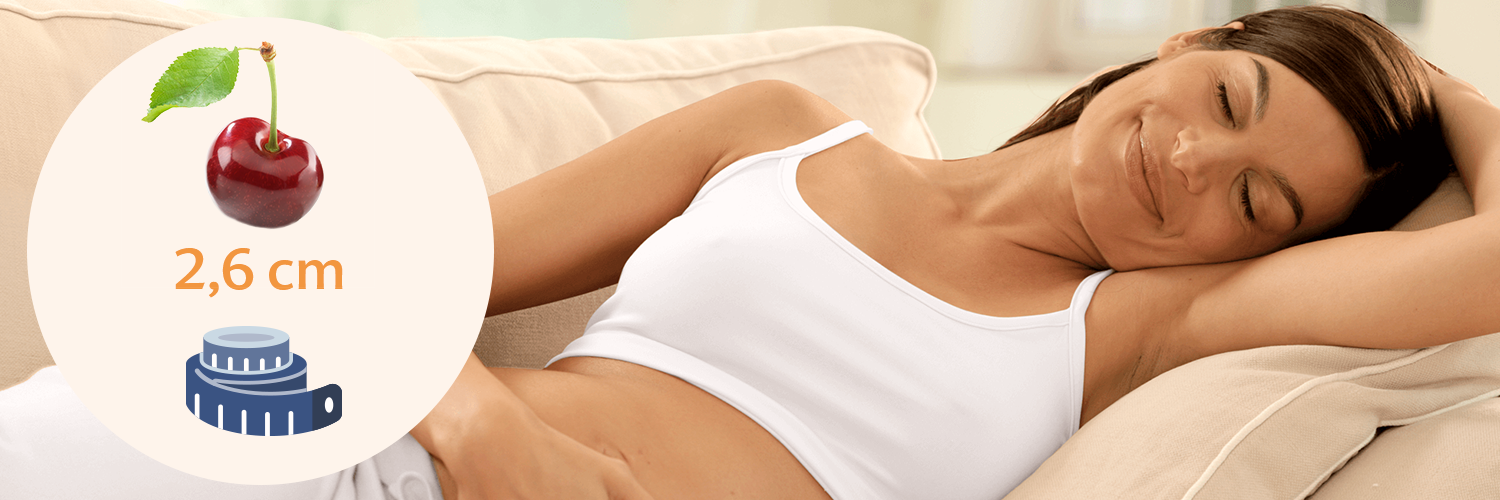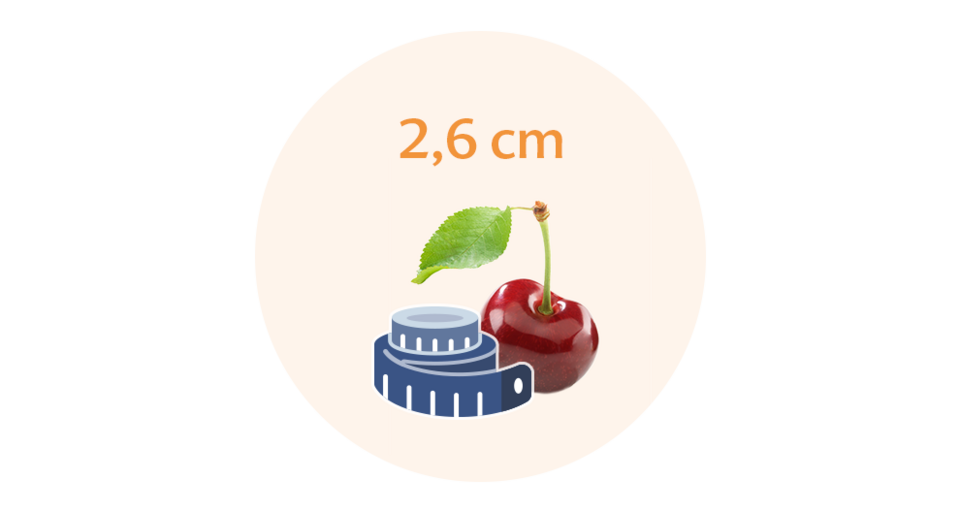The foetus, as the unborn child is now called by doctors until birth, is about 2.6 cm in size, so about as big as a cherry (its size can be measured in cm from week 9). Even though your baby will rapidly increase in size over the next few weeks, they still have plenty of space in your womb to practise, coordinate and refine their movements.
Pregnancy weeks:
Week 9 of pregnancy: Peanut becomes a baby

Size of your baby in week 9
Your baby’s development
What it’s like for the mum-to-be in week 9
Top tips
Questions you may want to ask your doctor or midwife
Size of the foetus in week 9

Your baby’s development
After the crucial embryonic period, which lasts from conception to week 8, your baby is now entering a new stage in their development. They’re no longer as sensitive and vulnerable as they were for the previous few weeks.
All their vital organ systems are in place by week 9, and the first ultrasound scan should normally take place between week 9 and week 12. The scan is to confirm that you’re pregnant, to check that the egg was successfully implanted in your uterus and that your baby has a healthy heartbeat, and to confirm or adjust your due date. At this stage, your doctor will also be able to tell if you’re expecting just one baby or if it’s twins.
Many of your baby’s internal organs have started to work, though they won’t yet be doing everything they will eventually need to do.
The main development in week 9 is the formation of your baby’s nerve tracts, which means they can feel stimuli and react to them. They will practise this constantly over the coming weeks and months.
Your baby’s features and appearance are becoming more and more human. Their head is upright, they’re stretching and they’re using their limbs to make their first movements, which for now are still more like convulsions.
Your baby’s fingers and toes continue to develop, and week 9 is also when their wrists begin to form. The webbing that used to join their toes together has now almost completely disappeared, and so has their tail, which makes way as the spine develops and the individual vertebrae form. By the time they’re born, they will have 33 or 34 vertebrae connected flexibly by the intervertebral discs, which give their back its range of movements and allow it to bend.
To protect their delicate brain, their bony skull starts to form from week 9 (it was only made up of cartilage before then). Other bones also continue to form, although they are still soft during this development period and have not yet adopted their final bone structure.
Also picking up pace at this stage is your baby’s brain development: important regions of their brain are forming, which will control organ systems and hormone levels. The stimuli they will feel over the next few weeks will encourage their brain’s development (because these stimuli need to be processed), and sending the stimuli to the brain via the nervous system boosts their nerve tract development as well. Your baby’s brain will still not be fully developed by the time they’re born – nowhere near, in fact. In their early years, your child will learn a whole host of new abilities and skills to help them navigate the challenges of the big wide world, and it’s not until they reach early adulthood that their brain will be fully developed with all the brain functions and mental abilities they need.
What it’s like for the mum-to-be in week 9
The typical symptoms will continue to ease, as by now your body has almost completely adapted to the changing levels of hormones. You might still feel more tired than usual, but this should also stop being a problem by the end of the third month of your pregnancy. Then you’ll start to feel a great sense of anticipation and creativity, and you’ll be full of energy.
Common signs and symptoms
There’s still no sign of a bump, but there are other common signs that might give the game away that you’re pregnant.
Changes to your skin and hair
In week 9, mums-to-be frequently notice changes in their skin and hair. Some women’s hair gets thicker and more glossy, while other women’s hair gets thinner. These symptoms are also caused by changing levels of hormones as a result of pregnancy and, after you give birth, they’ll quickly subside as your hormone levels return to normal.Gently treating your hair with a mild shampoo can be helpful.
You can still blow-dry your hair, but you should steer clear of dyes or cold perms, as the chemicals involved can be absorbed by your hair roots and enter your bloodstream. From there, these substances can harm your baby. However, that doesn’t mean you can’t do anything colourful with your hair: gentle tints and natural henna dyes won’t cause any problems.
Your skin will also react to the hormones now coursing through your body. On the one hand, it will become softer and have a healthy glow thanks to the increased blood circulation, while on the other hand, you may see a few spots here and there. Gentle treatment is again the best answer – never use aggressive anti-spot cosmetics to try and improve your skin during pregnancy.
Top tips
- Make sure you get enough calcium, which helps your baby’s organs to grow properly.
- Buy a bra made from comfortable material that will adapt and stretch as your breasts grow bigger (it may be a good idea to buy one size up).
- Do gentle gym exercises every day, go for walks and don’t spare yourself too much in everyday life (climbing stairs, cleaning, etc.). Women who keep physically active during pregnancy usually experience fewer symptoms and have an easier birth.
- Discuss what’s happening, and what’s going to happen, with your partner as a family. Pregnancy often triggers men’s protective instinct.
Questions you may want to ask your doctor or midwife
Sensitive gums
The same hormones that make your breasts get bigger and soften the tissue also make your gums more sensitive, which means you may notice small amounts of bleeding when you brush your teeth. Your saliva is also more aggressive than usual (like your stomach acid) and can damage your teeth – you might have heard the old wives’ tale “Gain a child, lose a tooth”. So make sure you clean your teeth 2-3 times a day with a medium soft to soft toothbrush. We also recommend that you visit your dentist and get your teeth professionally cleaned regularly.
Nosebleeds
You might also get nosebleeds every now and then. If it’s only a small amount of blood, then there’s no need for any treatment, but ask your doctor or midwife if you’re unsure because they can give you tips on how best to deal with it.
Information about the author:
Juliane Jacke-Gerlitz is a registered nurse. She has been working in the field of mother and breastfeeding counselling for more than ten years. Currently she is working as a medical writer and psychological consultant. Juliane Jacke-Gerlitz has been married for 22 years, is a mother of eight children and lives with her family in Halle.




